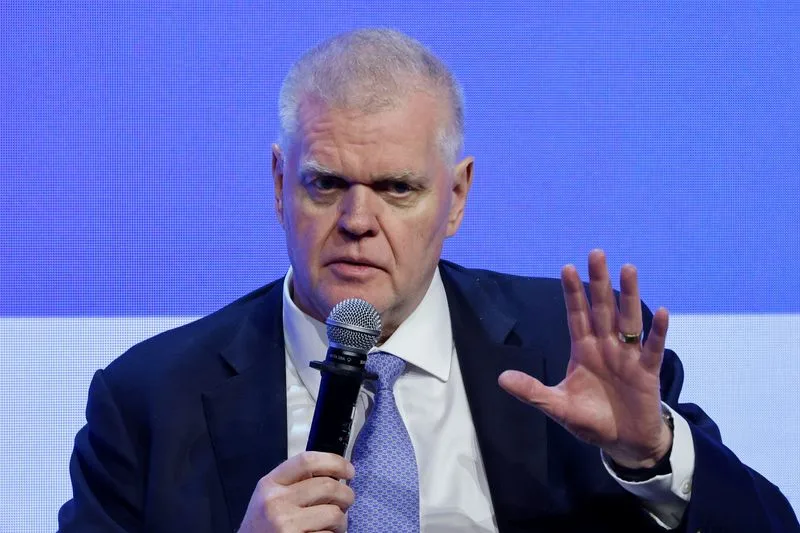
HSBC Chief Executive Noel Quinn said on Tuesday that he plans to step down, marking the surprise departure of a hard-nosed leader who has overseen a raft of asset sales, guided the lender to record profit and lifted its share price.
The bank is aiming to complete the succession process in the second half of this year, with both internal and external candidates to be considered.
Chief Financial Officer Georges Elhedery is likely the leading internal candidate for the job. The former head of the bank’s markets business was appointed to the No. 2 role over a year ago.
Quinn, 62, who has been in the job for five years said he wanted a better work-life balance and planned to move into a portfolio job.
“I’ve held intensive leadership roles since I took on a commercial bank role in October 2008 so I’m personally ready for a change,” he told reporters on a conference call.
“It’s also a natural inflection point for the bank, as it comes to the end of the current transformation phase. It’s an ideal time to bring in leadership to move the bank forward over the next five years.”
HSBC’s shares, which have gained roughly 30% during his tenure, rose 2.5% in London against a benchmark FTSE index up 0.3%, having earlier touched a nine-month high in Hong Kong’s afternoon session.
Quinn has boosted the bank’s returns by cutting underperforming businesses in the West, including retail banking businesses in the U.S. and France, its entire Canadian subsidiary and units in smaller markets such as Argentina.
“He took the reins just as the pandemic was spreading across the world, a hugely uncertain time to lead a global bank and pivot away from its more traditional markets. He’s also had to navigate geopolitical tensions between the U.S. and China,” said Matt Britzman, equity analyst at Hargreaves Lansdown.
“He may be a hard act to follow, but market reaction suggests the strong position he leaves behind is enough to quell any uncertainty about who’ll lead the business from here,” he added.
Quinn will remain CEO until his successor starts in the role, and has agreed to remain available through to the end of his 12-month notice period expiring on April 30, 2025, the bank said.
Some HSBC staff also believe that Nuno Matos, currently the bank’s global head for wealth and personal banking, could replace Quinn, according to a senior HSBC executive with direct knowledge of the bank’s China strategy and business and who was speaking on condition of anonymity.
HSBC Chairman Mark Tucker declined to comment on potential CEO candidates.
NAVIGATING CHALLENGES
Quinn, who joined HSBC in 1987, was named chief executive in March 2020, after serving as an interim CEO following the ouster of his predecessor John Flint who had been in the job for less than two years and had failed to stem a sharp share price decline.
Quinn’s challenges included a regulator-induced suspension of its dividend payouts which enraged many retail shareholders, and pressures on the bank’s business customers as trade and supply chains faltered worldwide.
He also won a major showdown with the bank’s No. 1 Asian investor, China’s Ping An Insurance, which ran a multi-year campaign to try and get HSBC to spin off its Asia business, which ended in defeat at the bank’s shareholder meeting last year.
Amid escalating Sino-Western political tensions during Quinn’s tenure, HSBC also faced criticism from lawmakers in the U.S. and Britain who said the bank should have resisted pressure from Beijing to freeze the bank accounts of pro-democracy activists in Hong Kong, among other issues.
HSBC at the time said it was merely complying with local laws.
HSBC reported pretax profit of $12.7 billion, slightly ahead of forecasts, for the quarter ended March versus $12.9 billion a year earlier, as it struggled to cope with rising costs from its expansion in Asia. Last year it logged an annual record profit of $30 billion.
The London-headquartered bank also announced $3 billion worth of share buybacks on top of $2 billion in share purchases announced in February.
The bank said it continued to target a return on average tangible equity in the “mid-teens” for 2024, with banking net interest income of at least $41 billion.





























